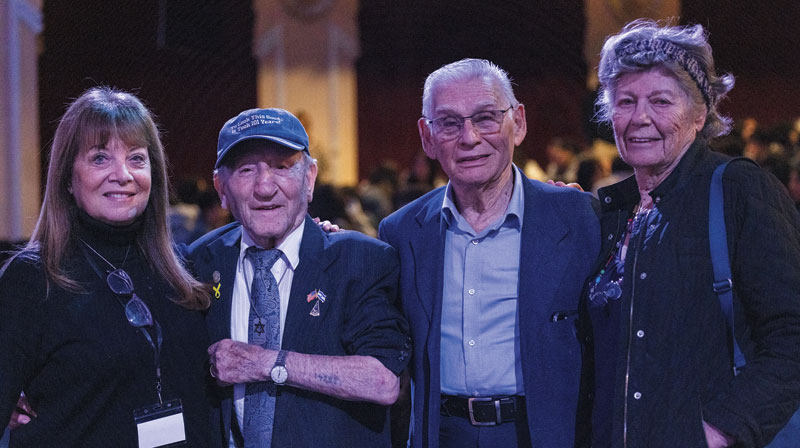Young American Jews are increasingly alienated from Israel, according to a report released last week.
The report, titled “Beyond Distancing: Young Adult American Jews and their Alienation from Israel” and commissioned by The Andrea and Charles Bronfman Philanthropies, generally substantiates current suspicions rather than revealing new surprises.
The major findings are that successively younger American Jews feel increasingly distant from Israel, and that the trend has been increasing steadily for decades.
For example, fewer than half (48 percent) of respondents younger than 35 agreed that “Israel’s destruction would be a personal tragedy,” compared to 78 percent of those 65 and older. And just 54 percent of the younger group is “comfortable with the idea of a Jewish State,” compared to 81 percent of those 65 or older, 74 percent of those in the 50-64 age group and 64 percent in the 35-49 group.
The report is based on data from the 2007 National Survey of American Jews, a mail- and Web-administered survey conducted in December 2006 and January 2007 by Synovate, Inc. It only considers the attitudes of non-Orthodox Jews. Of 1,828 respondents, 124 Orthodox were removed from the sample on the assumption that their relationship to Israel is markedly closer than that of their non-Orthodox peers.
According to one of the report’s co-authors, Steven Cohen, a sociologist and research professor at Hebrew Union College-Jewish Institute of Religion in New York, the generational differences are more a function of the decade people were born than where they are on the life-cycle continuum. That means the American Jewish detachment from Israel will increase as younger Jews age and replace their parents and grandparents’ generations.
“There is growing discomfort with the drawing of hard group boundaries of all sorts,” Cohen said of the so-called “millennials,” those born after 1980. “The idea of a Jewish state reflects hard group boundaries, that there is a distinction between Jews and everybody else. That does not sit well with young Jews.”
Overall, the picture of detachment from Israel is not as dismal as those figures might suggest, Cohen argued. More than 60 percent of Jews younger than 35 in the study show “some level” of attachment to or caring about Israel.
“The glass is still half full, it’s just not as full as it used to be,” said Cohen, who wrote the report with Ari Kelman, assistant professor of American studies at UC Davis.
Political leanings didn’t seem to affect the attitudes of younger Jews toward Israel. In fact, the data suggest that those who say they vote Republican or describe themselves as politically conservative are more alienated from Israel than self-professed liberals.
Cohen surmised that there are so few young, non-Orthodox, right-wing American Jews that they are distanced from their Jewish peers in general, including when it comes to Israel.
The overall slide in attachment to or interest in Israel does not mean that young American Jews are less “Jewish.” On the contrary, numerous recent studies and anecdotal evidence demonstrate great cultural and religious vitality and creativity among young Jews. Israel is just not as much a part of the picture, which should concern the greater community, the report warns.
“It’s worrying that young Jews may be creating a latter-day Jewish Bundism, which affirms Jewish belonging but is neutral to the Zionist enterprise,” Cohen said. “We’re seeing this growing phenomenon of Jews who have no problem saying the Shema but won’t sing ‘Hatikvah.'”
Rabbi Elie Kaunfer, executive director of Mechon Hadar, which provides networking and support to startup minyans nationwide, seconded the notion that young Jews have a more nuanced attitude toward Israel than their elders. In the independent minyan movement, he said, that means they have not yet figured out how to do Israel programming.
“I think that reflects a problem that our generation has not solved: how to engage with Israel without slogan-slinging” — left-wing or right-wing — “but still remain emotionally engaged,” he said.
Kaunfer described Israel Independence Day celebrations at these minyans as “muted, not because of a lack of connection to Israel, but because we are still searching for appropriate ways to celebrate and connect to” the Jewish state.
One factor that seems to increase the attachment of young Jews to Israel quite dramatically is, not surprisingly, spending time in Israel.
While the report shows that 19 percent of young Jews who have never been to Israel exhibit a “high” level of attachment to the country, the number jumps to 34 percent after a first trip and 52 percent after two or more trips. Conversely, 42 percent of young Jews who have never been to Israel report a “low” level of attachment. That number drops to 17 percent after just one trip.
The policy implications?
“Trips matter,” Cohen and Kelman write. “More trips are better than fewer, and trips of longer duration have more impact than those with shorter duration.”
“In some ways, that’s the most dramatic finding” of the report, said Barry Chazan, professor of Jewish education at Spertus College in Chicago and educational director of Birthright Israel, which has taken nearly 150,000 college-age and post-college Jews to Israel over the past seven years.
The finding confirms what Chazan and his colleagues have been telling people: Taking young American Jews to Israel on these free, carefully organized trips is a powerful tool in Jewish identity-building.
“The motivation is strong; they’re not being dragged there,” he said. “They get a hefty dose of Zionist history, Jewish history and contemporary Israel. It’s very explicitly about that.”
Chazan has just finished a book about Birthright, scheduled for a publication this spring, with Leonard Saxe, director of the Cohen Center for Modern Jewish Studies at Brandeis University. They dispute the Cohen-Kelman report’s prediction of a continuing downslide in American Jewish attachment to Israel, and say Birthright has a lot to do with their optimism.
“Tens of thousands of young adults are having these experiences in Israel,” Saxe said. “It will create a generation of people who know Israel and are interested in Israel that is unprecedented.”






















 More news and opinions than at a Shabbat dinner, right in your inbox.
More news and opinions than at a Shabbat dinner, right in your inbox.